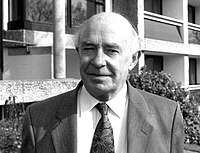David Smith (botanist)
David Cecil Smith FRS FRSE FLS(born 21 May 1930 Port Talbot, South Wales – 29 June 2018[1]) was a British botanist. Smith was most notable for his research into the biology of symbiosis and became a leading authority on it.[2] Smith discovered that lichens and Radiata (coelenterates) shared a similar biological mechanism in carbohydrate metabolism. Further research by Smith demonstrated similar processes in organisms that worked within a symbiotic relationship.[3]
Sir David Cecil Smith | |
|---|---|
 | |
| Principal of Edinburgh University | |
| In office 1987–1994 | |
| President of Wolfson College, Oxford | |
| In office 1994–2000 | |
| Born | 21 May 1930 |
| Died | 29 June 2018 (aged 88) |
| Nationality | British |
| Education | Colston's School, St Paul's School, London, The Queen's College, Oxford |
| Known for | Discovery that organisms in symbiotic relationship, had similar biological processes. |
| Spouse(s) | Lesley Mutch |
| Children | Bryony, Adam and Cameron |
| Awards | Linnean Gold Medal |
| Scientific career | |
| Fields | botany |
| Institutions | University of California, Berkeley, Wadham College, Oxford, Bristol University, University of Edinburgh |
Life
Smith was the youngest of two sons, brother to Frank. His parents were William Smith, a mining engineer, and Elva who was a teacher.[2] Smith's brother Frank was killed in Canada. In the 1920s, Smith's parents went to work in Sinai desert.[2] His father initially worked as a mining engineer, before securing a position as the director of a Manganese mine.[4] The family remained in the Sinai desert until the end of World War II, except for occasional periods of leave. In one such period, Smith was born, and lived in the Sinai desert until he was five, when he returned to the UK to live with his grandparents and an aunt.[4]
Smith's early education was at Colston's School, Bristol. When his parents returned to the UK to live in Hatch End, London,[2] Smith was moved to St Paul's School, London, to continue his education.[5] It was while St Paul's School, that his interest in the subject of biology started, while on field trips.[4] Smith then studied botany at The Queen's College, Oxford was awarded a Bachelor of Arts in Botany, achieving a First-class honours in 1951.[5] Smith immediately followed this with a promotion to D.Phil in 1954.[4]
In 1965, he married Lesley Mutch, a Scottish doctor and had three children together, called Bryony, Adam and Cameron. Upon his retirement, the family returned to Morningside in Edinburgh in 2000.[4]
Career
Smith completed his Doctor of Philosophy in two years, as his National service was impending. He spent his time in Germany, and joined the Intelligence Corps to research Nuclear warfare.[4] Upon returning from national service, he was appointed to a research fellowship at The Queen's College, Oxford before, before visiting the United States under a Harkness Fellowship to conduct research at the University of California, Berkeley.[6][1]
Smith returned to the United Kingdom to a post as a university lecturer in the Department of Agricultural Science at University of Oxford. Smith was then appointed as a Royal Society Senior research fellow at Wadham College, Oxford from 1964 to 1971. From 1971 to 1974 Smith followed up that position at the same college as Tutorial Fellow (a senior Oxford academic rank), followed by Admissions Tutor at the same college.[6]
From 1970 to 1980 Smith held the Melville Wills Chair of Botany at Bristol University. Smith subsequently returned to position at Oxford in 1980 as the Sibthorpian Professor of Rural Economy,[6] named in honour of John Sibthorp. With that position was director of the Department of Agricultural Science.[6]
In 1987 to 1994, Smith was appointed as Principal of the University of Edinburgh.[7] From 1994 to September 2000 Smith was President of Wolfson College[8] He became an Honorary Fellow of Wadham College in 2002.
He was a distinguished supporter of Humanists UK.[9]
He was a member of the Advisory Council for the Campaign for Science and Engineering.[10]
Honors and awards
Smith also received an Honorary Doctorate from Heriot-Watt University in 1993 [11] He was elected as a Fellow of the Royal Society in 1975 and was biological secretary from 1983–1987.[3][12] Smith was awarded the Gold Medal for Botany of the Linnean Society and served as its President (2000–2003).
References
- "Praise for Sir David Smith, former Principal". 4 July 2018. Retrieved 4 July 2018.
- "Obituary Sir David Smith". Times Newspapers. The Times. 12 July 2018. Retrieved 11 November 2018.
- "David Smith". The Royal Society. Biography. 1975. Retrieved 11 November 2018.
- Jack, Davidson (23 July 2018). "Obituary: Sir David Smith, botanist and former Principal of Edinburgh University". Johnston Publishing. The Scotsman. Retrieved 11 November 2018.
- "Papers of Sir David Smith, Principal of Edinburgh University 1987-1994 (b. 1930)". Jisc. E2006.05: Edinburgh University Library Special Collections. Retrieved 11 November 2018.CS1 maint: location (link)
- "Sir David Smith" (Obituary). Wolfson College. University of Oxford. 29 June 2018. Retrieved 11 November 2018.
- "Praise for Sir David Smith, former Principal". The University of Edinburgh 2018. University of Edinburgh. 5 July 2018. Retrieved 11 November 2018.
- Sir Gareth to take over at Wolfson College, Times Higher Education Supplement, 17 December 1999.
- Humanism.org website
- "Advisory Council of the Campaign for Science and Engineering". Archived from the original on 28 August 2010. Retrieved 11 February 2011.
- webperson@hw.ac.uk. "Heriot-Watt University Edinburgh: Honorary Graduates". www1.hw.ac.uk. Retrieved 5 April 2016.
- Douglas, Angela E. (2019). "Sir David Cecil Smith. 21 May 1930—29 June 2018". Biographical Memoirs of Fellows of the Royal Society. 67.
| Academic offices | ||
|---|---|---|
| Preceded by John Harrison Burnett |
Principal of Edinburgh University 1987–1994 |
Succeeded by Stewart Sutherland, Baron Sutherland of Houndwood |
| Preceded by William James Kennedy (acting) |
President of Wolfson College, Oxford 1994–2000 |
Succeeded by Jon Stallworthy (acting) |